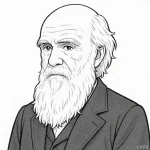“Man is the only creature that consumes without producing. He does not give milk, he does not lay eggs, he is too weak to pull the plough, he cannot run fast enough to catch rabbits. Yet he is lord of all the animals.”

- June 25, 1903 – January 21, 1950
- Born in India during the British colonial period
- Author, journalist
table of contents
Quote
“Man is the only creature that consumes without producing. He does not give milk, he does not lay eggs, he is too weak to pull the plough, he cannot run fast enough to catch rabbits. Yet he is lord of all the animals.”
Explanation
In this quote, George Orwell reflects on the paradox of humanity’s position in the natural world. Despite humans being physically weak and lacking the direct means to produce or survive as other animals do—such as giving milk, laying eggs, or hunting—humans have somehow ascended to the top of the food chain and dominate all other species. Orwell highlights the contradiction between humanity’s dependence on other creatures and the fact that humans, unlike any other species, have positioned themselves as the rulers of nature. This observation can be seen as a critique of human arrogance and the unsustainable exploitation of the natural world.
Orwell’s analysis touches on broader themes of human supremacy and social structures. In Animal Farm, Orwell critiques how political systems often establish power hierarchies that maintain control despite the inherent inequalities and unfairness they create. The idea that humans are lords of the animals despite their lack of natural prowess mirrors how humans have built systems of social control and exploitation that prioritize power over merit or fairness. This also connects to Orwell’s view on capitalism and class structures, where the rich and powerful are often seen as above nature or morality, profiting from the labor of others without contributing meaningfully.
In modern society, this quote can be applied to our relationship with nature and consumerism. Humans often exploit the environment for resources without directly contributing to the natural systems that sustain life, leading to unsustainable practices like deforestation, pollution, and climate change. Orwell’s quote invites us to reconsider our role as stewards of the Earth, questioning whether our position as the dominant species is truly justified, or whether it reflects a deeper disconnect between our needs and the way we interact with the planet. It serves as a reminder of the unsustainable nature of our power and dominance and challenges the notion of human supremacy in a world that relies on balance and interdependence.
Would you like to share your impressions or related stories about this quote in the comments section?



